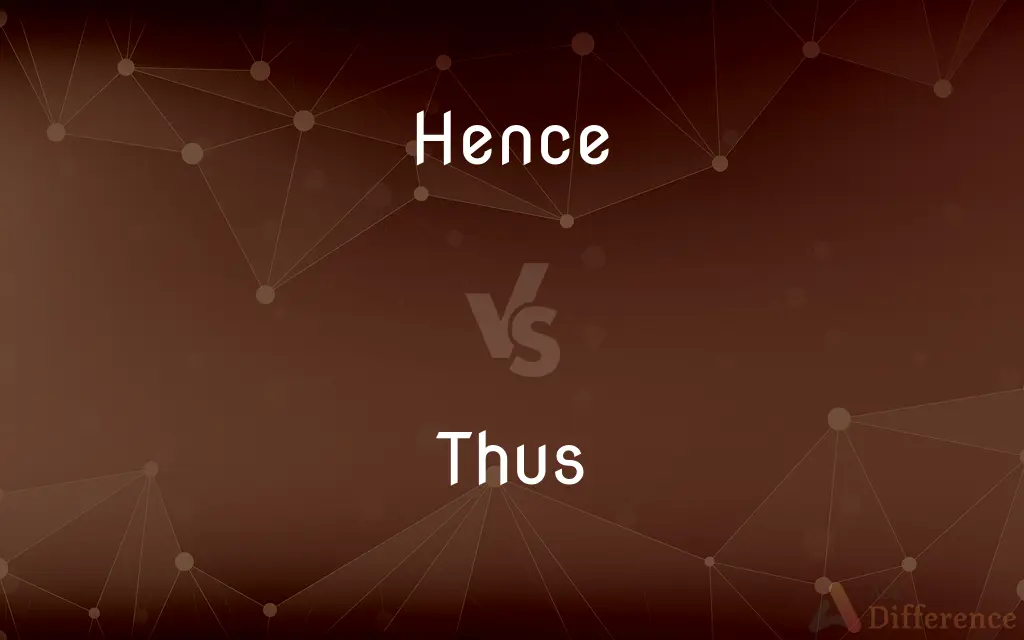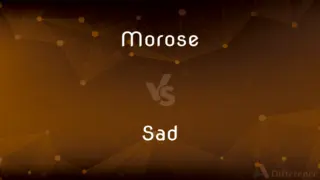Hence vs. Thus — What's the Difference?
By Tayyaba Rehman — Updated on September 18, 2023
Both "hence" and "thus" imply a consequence or result, but "hence" often suggests a future implication or action, while "thus" typically denotes a logical conclusion.

Difference Between Hence and Thus
Table of Contents
ADVERTISEMENT
Key Differences
"Hence" and "thus" are transitional adverbs used to express cause and effect or a logical relationship between statements. While they can sometimes be used interchangeably, they do have distinct nuances.
"Hence" generally indicates a future implication or action resulting from a given statement. It can imply a direction, often translating to "from this time" or "from this place." It also can suggest a cause-and-effect relationship with a forward-looking perspective. "Thus" on the other hand, typically provides a conclusion or inference drawn from the preceding statement, often interchangeable with "therefore" or "so."
When considering their historical usage, "hence" originated from the idea of "from this place" or "from this time." Over time, it's evolved to represent cause and effect but with a tilt towards future action or implication. "Thus," derived from Old English, has always centered around the concept of "in this way" or "as a result," reinforcing its role in presenting logical conclusions.
To illustrate with examples: "She was absent; hence, she didn't hear the announcement," implies the future consequence of her absence. "He was late to the meeting; thus, he missed the introduction," establishes a direct conclusion based on his tardiness.
Even though "hence" and "thus" can often be used interchangeably in modern English, especially in informal settings, understanding their subtle differences can enrich one's expression and comprehension, especially in formal or academic contexts.
ADVERTISEMENT
Comparison Chart
Implication
Future-oriented or from this point
Logical conclusion or result
Historical Origin
From "from this place" or "from this time"
From "in this way" or "as a result"
Common Equivalents
Therefore (in some contexts), from now on
Therefore, so, in this manner
Usage Example
He's leaving; hence, his room will be vacant.
He didn't study; thus, he failed the test.
Nuance in Sentences
Suggests consequences or future implications
Indicates a direct result or conclusion
Compare with Definitions
Hence
From this point in time or place.
The event is a week away, hence the need for immediate action.
Thus
In this way or manner.
Arrange the items thus for a better display.
Hence
As a consequence or result.
She was tired, hence her decision to rest.
Thus
To such a degree or extent.
Never had he seen a storm thus raging.
Hence
In the future (from now).
The new policy will take effect a month hence.
Thus
Establishing a conclusion.
The evidence is clear; thus, he is guilty.
Hence
For this reason; therefore
Handmade and hence expensive.
Thus
As an evidence or example.
The artist, thus inspired, created a masterpiece.
Hence
From this source
They grew up in the Sudan.
Hence their interest in Nubian art.
Thus
Consequently or therefore.
He was late; thus, he missed the beginning.
Hence
From this time; from now
A year hence it will be forgotten.
Thus
In this manner
Lay the pieces out thus. See Usage Note at thusly.
Hence
From this place; away from here
Get you hence!.
Thus
To a stated degree or extent; so.
Hence
From this life.
Thus
Therefore; consequently
Thus it was necessary for me to resign.
Hence
(archaic) from here, from this place, away
I'm going hence, because you have insulted me.
Get thee hence, Satan!
Thus
For example
Few of the nation's largest cities are state capitals.
Thus neither New York nor Chicago is the seat of its state's government.
Hence
From the living or from this world
After a long battle, my poor daughter was taken hence.
Thus
(manner) In this way or manner.
If you throw the ball thus, as I’m showing you, you’ll have better luck hitting the target.
Hence
(of a length of time) in the future from now
A year hence it will be forgotten.
Thus
(conjunctive) As a result.
I have all the tools I need; thus, I will be able to fix the car without having to call a mechanic.
Hence
(conjunctive) as a result; therefore, for this reason
I shall go to Japan and hence will not be here in time for the party.
The purse is handmade and hence very expensive.
Thus
The commoner kind of frankincense, or that obtained from the Norway spruce, the long-leaved pine, and other conifers.
Hence
(obsolete) Go away! Begone!
"...Hence! and bestow your dead
Where no wrong against him cries!"
Thus
In this or that manner; on this wise.
Thus did Noah; according to all that God commanded him, so did he.
Thus God the heaven created, thus the earth.
Hence
To utter "hence!" to; to send away.
Thus
To this degree or extent; so far; so; as, thus wise; thus peaceble; thus bold.
Thus far extend, thus far thy bounds.
Hence
To depart; to go away.
Thus
An aromatic gum resin obtained from various Arabian or East African trees; formerly valued for worship and for embalming and fumigation
Hence
From this place; away.
Arise, let us go hence.
I will send thee far hence unto the Gentiles.
Thus
(used to introduce a logical conclusion) from that fact or reason or as a result;
Therefore X must be true
The eggs were fresh and hence satisfactory
We were young and thence optimistic
It is late and thus we must go
The witness is biased and so cannot be trusted
Hence
From this time; in the future; as, a week hence.
Thus
In the way indicated;
Hold the brush so
Set up the pieces thus
Hence
From this reason; therefore; - as an inference or deduction.
Hence, perhaps, it is, that Solomon calls the fear of the Lord the beginning of wisdom.
Hence
From this source or origin.
All other faces borrowed henceTheir light and grace.
Whence come wars and fightings among you? Come they not hence, even of your lusts?
An ancient author prophesied from hence.
Expelled from hence into a worldOf woe and sorrow.
Hence
To send away.
Hence
(used to introduce a logical conclusion) from that fact or reason or as a result;
Therefore X must be true
The eggs were fresh and hence satisfactory
We were young and thence optimistic
It is late and thus we must go
The witness is biased and so cannot be trusted
Hence
From this place;
Get thee hence!
Hence
From this time;
A year hence it will be forgotten
Hence
For this reason or because of this.
He's fluent in French; hence, he was chosen as the translator.
Common Curiosities
Is "thus" synonymous with "therefore"?
Yes, "thus" can often be replaced by "therefore" to denote a conclusion.
Is "thus" related to the method or manner of doing something?
Yes, e.g., "Arrange the items thus."
Can "hence" mean "from now"?
Yes, e.g., "He will arrive a week hence."
Does "hence" always imply causation?
Often, but not always. It can also denote time or direction.
Does "hence" always imply a future action?
Not always, but it frequently has a forward-looking implication.
What's a simple way to remember the difference between "hence" and "thus"?
Think "hence" for future or direction, and "thus" for logical conclusion.
How do I choose between "hence" and "thus"?
Consider if you're suggesting a future implication ("hence") or presenting a logical conclusion ("thus").
Does "thus" imply a direct result?
Typically, yes. It indicates a result or conclusion from the given information.
Can "hence" and "thus" be used interchangeably?
Often, yes, especially in informal contexts, but they have subtle nuances in meaning.
Is "thus" more formal than "hence"?
Both are formal, but "thus" is more commonly used in academic and logical contexts.
Can "thus" be used to emphasize the degree of something?
Yes, e.g., "She was thus upset she didn't speak."
Are "hence" and "thus" outdated?
While formal, both words are still used, especially in academic, legal, and formal writing contexts.
Can "hence" be used to mean "from this origin"?
Yes, e.g., "The word is Latin, hence its spelling."
Do both words have roots in Old English?
Yes, but they've evolved in meaning over time.
Is "henceforth" related to "hence"?
Yes, "henceforth" means "from this time forward," emphasizing the future implication of "hence."
Share Your Discovery

Previous Comparison
Efflux vs. Influx
Next Comparison
Morose vs. SadAuthor Spotlight
Written by
Tayyaba RehmanTayyaba Rehman is a distinguished writer, currently serving as a primary contributor to askdifference.com. As a researcher in semantics and etymology, Tayyaba's passion for the complexity of languages and their distinctions has found a perfect home on the platform. Tayyaba delves into the intricacies of language, distinguishing between commonly confused words and phrases, thereby providing clarity for readers worldwide.













































